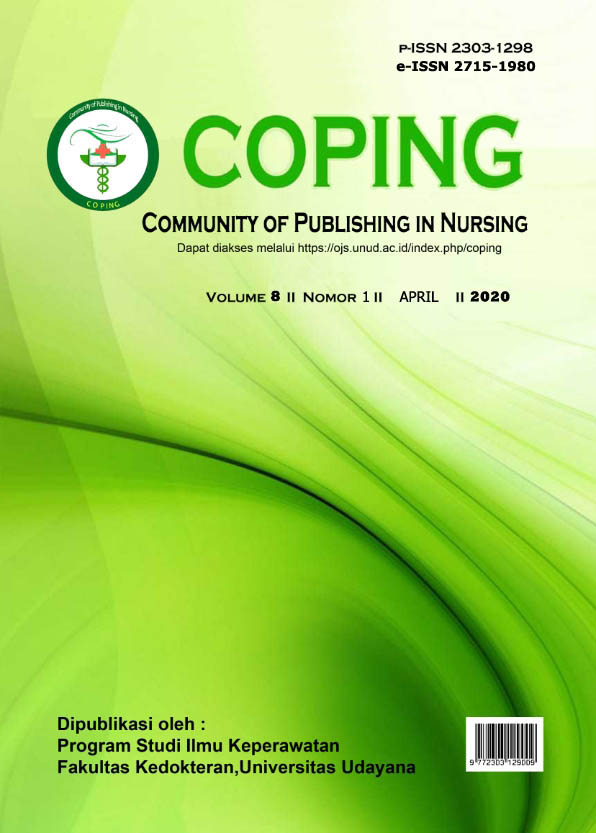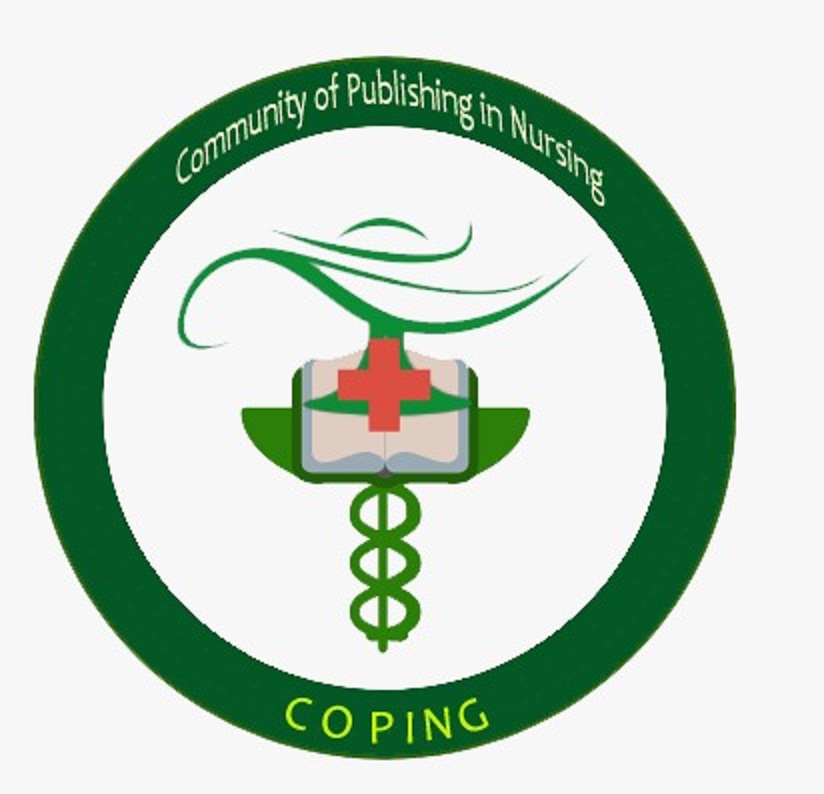Hubungan Self-Efficacy dengan Self-Management Behaviour pada Pasien Hipertensi
Abstract
Hipertensi merupakan salah satu penyakit kronis yang menjadi perhatian utama karena morbiditas dan mortalitas yang tinggi. Self-management behaviour mempunyai peranan penting untuk mengontrol tekanan darah pada pasien hipertensi secara efektif. Self-efficacy merupakan konsep dasar self-management behaviour yang akan berpengaruh terhadap keyakinan pasien hipertensi. Tujuan penelitian ini adalah untuk mengetahui hubungan self-efficacy dengan self-management behaviour pada pasien hipertensi di wilayah kerja Puskesmas III Denpasar Utara. Penelitian ini merupakan penelitian jenis correlational dengan design cross sectional. Sampel penelitian ini adalah 61 pasien hipertensi yang dipilih dengan teknik non-probability yaitu total sampling. Instrumen penelitian yang digunakan yaitu kuesioner Self-efficacy to Manage Hypertension-Five Item Scale dan Hypertension Self-management Behaviour Questionnaire. Hubungan self-efficacy dengan self-management behaviour dianalisis menggunakan Spearman Rank karena data tidak terdistribusi normal. Hasil penelitian ini menunjukkan bahwa sebagian besar responden memiliki self-management behaviour tingkat sedang dan self-efficacy tingkat buruk. Uji Spearman Rank menunjukkan hasil yang signifikan dengan hasil p-value yaitu 0,000 (p<0,05), r=0,794, R=63,04 dengan tingkat kesalahan 5%. Kesimpulan dalam penelitian ini adalah ada hubungan antara self-efficacy dengan self-management behaviour pada pasien hipertensi di wilayah kerja Puskesmas III Denpasar Utara. Berdasarkan hasil penelitian, disarankan untuk mengembangkan intervensi keperawatan yang dapat meningkatkan self-efficacy pada pasien dengan hipertensi sehingga berdampak pada self-management behaviour.
Kata kunci: hipertensi, self-efficacy, self-management behavior
ABSTRACT
Hypertension is one of chronic diseases and the main concern because of its high morbidity and mortality. Self-management behaviour has an important role to control blood pressure among hypertensive patients in effective way. Self-efficacy is the basic/main concept of self-management behaviour which give an impact to confidence of hypertensive patients. This study aimed to investigate the correlation between self-efficacy and self-management behaviour among hypertensive patients in Puskesmas III Denpasar Utara. This study was a correlational study with cross sectional design. Non-probability sampling with total sampling was used to recruit 61 hypertensive patients. The research instruments included Self-efficacy to Manage Hypertension-Five Item Scale and Hypertension Self-management Behaviour Questionnaire. In order to determine the correlation between self-efficacy and self-management behaviour, Spearman Rank was used because the data weren’t normally distributed. The results of this study show that most of hypertensive patients have moderate level of self-management behaviour, while for self-efficacy have a bad level. Spearman Rank test shows the significant result with p-value=0,000 (p<0,05), r=0,794, R=63,04, error level 5%. In conclusion, there is a strong and positive correlation between self-efficacy and self-management behaviour among hypertensive patients in Puskesmas III Denpasar Utara. Based on the result of this study, it is suggested to develop nursing intervention to improve self-efficacy among hypertensive patients to affect the self-management behaviour.
Keywords: hypertension, self-efficacy, self-management behavior
Downloads
References
Akhter, N. (2010). Self-management among patients with hypertension in Bangladesh. Prince of Songkla University.
Arsyta, S. (2017). Hubungan dukungan keluarga dengan self-efficacy pada pasien dengan penyakit stroke di ruang rawat jalan poli saraf Rumah Sakit Umum Daerah Sultan Syarif Mohamad Alkadrie Kota Pontianak. Proners, 3(1).
Balaga, P. A. G. (2012). Self-efficacy and self-care management outcome of chronic renal failure patients. Asian Journal of Health, 2(1), 111-29.
Breaux-Shropshire, T. L., Brown, K. C., Pryor, E. R., & Maples, E. H. (2012). Relationship of blood pressure self-monitoring, medication adherence, self-efficacy, stage of change, and blood pressure control among municipal workers with hypertension. Workplace health & safety, 60(7), 303-311.
Dinas Kesehatan Provinsi Bali. (2016). Profil kesehatan provinsi Bali 2015. Denpasar: Dinas Kesehatan Provinsi Bali.
Ide, P. (2013). Agar otak sehat: Bahan pangan pilihan untuk menjaga otak tetap awet muda dan mencegah stroke dan demensia. Jakarta: PT Elex Media Komputindo.
Kauric-Klein, Z., Peters, R. M., & Yarandi, H. N. (2017). Self-efficacy and blood pressure self-care behaviors in patients on chronic hemodialysis. Western journal of nursing research, 39(7), 886-905.
Kaveh-Savadkooh, O., Zakerimoghadam, M., Gheyasvandian, S., & Kazemnejad, A. (2012). Effect of self-management program on self-efficacy in hypertensive patients. Journal of Mazandaran University of Medical Sciences, 22(92), 19-28.
Kemenkes RI. (2013). Riset kesehatan dasar (Riskesdas) 2013. Diunduh dari : www.depkes.go.id/resources/download/general/Hasil%20Riskesdas%202013.pdf.
Kusumastuty, I. Widyani, D. & Wahyuni, E.S. (2016). Asupan protein dan kalium berhubungan dengan penurunan tekanan darah pasien hipertensi rawat jalan. Indonesian Journal of Human Nutrition; 3(1): 19 – 28
Lee, E., & Park, E. (2017). Self-care behavior and related factors in older patients with uncontrolled hypertension. Contemporary nurse, 1-15.
Mcquiggan, S. W., Mott, B. W., & Lester, J. C. (2008). Modeling self-efficacy in intelligent tutoring systems: An inductive approach. User modeling and user-adapted interaction, 18(1), 81-123.
Meinema J.G, Van Dijk N, Beune E.J.A.J, Jaarsma D.A.D.C, Van Weert H.C.P.M, & Haafkens, J.A (2015). Determinants of adherence to treatment in hypertensive patients of african descent and the role of culturally appropriate education. PLoS ONE 10(8): e0133560. doi:10.1371/journal.pone.0133560
Padhy, M., Lalnuntluangi, R., Chelli, K., & Padiri, R. A. (2016). Social Support and Adherence among Hypertensive Patients.
Peñarrieta, M. I., Flores-Barrios, F., Gutiérrez-Gómez, T., Piñones-Martínez, S., Resendiz-Gonzalez, E., & María Quintero-Valle, L. (2015). Self-management and family support in chronic diseases. Journal of Nursing Education and Practice, 5(11), 73.
Sari, R. K., & Livana, P. H. (2016). FAKTOR-FAKTOR YANG MEMPENGARUHI HIPERTENSI. Jurnal Ilmiah permas: Jurnal Ilmiah Stikes Kendal, 6(1), 1-10.
Salim, dkk. (2015). Population dynamics and sustainable development in Indonesia. Jakarta: UNPFA Indoensia
Sudawam, S., & Livana, P. H. (2017). GAMBARAN TINGKAT STRES LANSIA DENGAN HIPERTENSI. Jurnal Ilmiah Permas: Jurnal Ilmiah STIKES Kendal, 7(1), 32-36.
Tambayong, J. (2010). Patofisiologi keperawatan. Jakarta: ECG.
Tsang, S. K., Hui, E. K., & Law, B. (2012). Self-efficacy as a positive youth development construct: a conceptual review. The Scientific World Journal, 2012.
Uldis, K. A. (2011). Self‐management in chronic illness: concept and dimensional analysis. Journal of Nursing and Healthcare of Chronic Illness, 3(2), 130-139.
Warren-Findlow, J., Seymour, R. B., & Huber, L. R. B. (2012). The association between self-efficacy and hypertension self-care activities among African American adults. Journal of community health, 37(1), 15-24.
World Health Organization (WHO). (2012). Non infection diseases progress. Diunduh dari: http://www.who.int/publication/.







